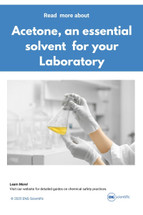May 14th 2025
Acetone, an Essential Solvent for your Laboratory
Acetone is a well-known organic solvent all over the world, remember your high school or college time you must have seen it or use it in your laboratory experiments. It is colorless, volatile, flammable and sweet in taste. It is one of the most common solvent used by different pharmaceutical and other industries as it dissolves many of the organic solvents. From salon to your school laboratories it is used everywhere almost in every industry.
Acetone is chemically known as propanone and has a chemical formula C3H6O; it is the simplest ketone with three carbons. Our body also produces ketone as a by product of the metabolism especially when the body is fasting. Today the acetone is industrially produced through the process of known as cumene in which benzene and propylene are reacted together to produce it. Acetone has a boiling point of 56 degree centigrade and freezing point of –95 degree centigrade. The density of acetone is 0.79g/cm3 and soluble in organic solvents such as ether.
Uses of Acetone
Solvent
Acetone is commonly used as a solvent in plastic, fibers, waxes, adhesive oils and resins. It is particularly also used for cleaning and fast evaporations processes.
Cosmetics
It is more used in many of the cosmetics industries. It is also used in removal of the nail polish, it does it by chemically dissolving the oils.
Laboratory Reagent
Acetone is also used in the as a cleaning reagent of glassware and other instruments due to the property of the solubility.
Paint thinner and remover
Acetone also serves as the paint thinner and also often used as paint remover.
Pharmaceutical Industry
Acetone is also used in the production of the pharmaceuticals, cosmetics, including skincare products, where acetone helps with absorption and the reaction stability.
Industrial Manufacturing
Acetone is used in synthetic rubber, plastic industry, and other chemicals like bisphenol and methacrylate.
Safety and Handling protocols
Acetone is highly flammable, one should keep it away from heat, open flames and sparks. Inhalation of acetone in high concentration can cause dizziness, respiratory problems, headache and you may experience skin irritation. Acetone should be stores in dry, cool and in a closed ventilated space or a fume hood. When handling or while using in the experiments, make sure to wear gloves and googles for hand and eye protection.
Environmental Impacts
Acetone breaks down and into air and water, making it somewhat eco-friendly compared to other solvents, but however large spill in the water can damage the aquatic life.
Conclusion
Acetone is a flexible and efficacious solvent with many usages, ranging from industrial production to everyday household chores. Despite its numerous advantages, we still need to be very careful when handling acetone, otherwise we expose ourselves to life-threatening diseases or hazards. If you are a chemist, this is a reminder for you to check out the safety measures related to the handling of acetone and if you happen to be a DIY enthusiast, the essence of knowing the proper ways to handle acetone is still necessary.
Why choose Eng scientific to purchase Chemicals
For high-purity lab chemicals, Eng Scientific is a reliable supplier that maintains standards and safety while providing affordable price, quick countrywide shipping, and consistent quality. We serve research labs, educational institutions, medical facilities, and industrial customers with our extensive product line, which includes acetone, potassium hydroxide, ethanol, buffers, and stains. Our user-friendly website guarantees a safe and seamless buying process, and our helpful customer service assists you in making wise choices. EngScientific.com is your go-to source for trustworthy chemical supplies and first-rate service, providing scientific confidence with every order. It is supported by stringent adherence to federal rules and dependable packaging.
Visit ENG Scientific to explore high-quality chemical solutions and expert guidance for your laboratory needs.

